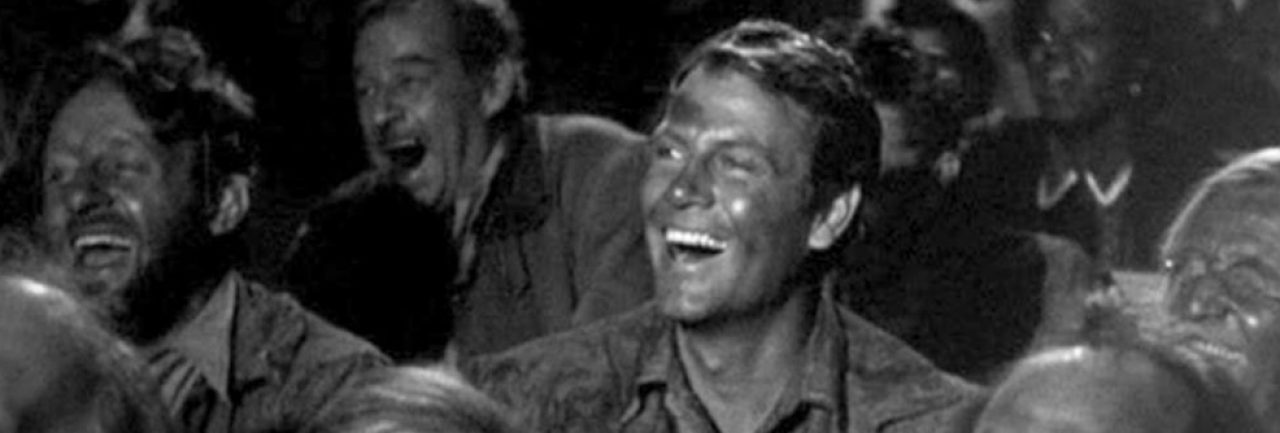With this post, I inaugurate a new tag: “Double dip.” It indicates films that have a movie-in-movie scene, and are also watched in a movie-in-movie scene in another film. The only other one I can think of at the moment is The Shining, which has a scene where characters watch Summer of ’42, and which is screening on the doomed drive-in in Twister. Come to think of it, there’s actually a sort of triple dip there: Summer of ’42 has a scene in which characters are watching Now, Voyager. Watch this space for a fuller account.
The topic for today is Brief Encounter, which has been used in more than a dozen films and television shows. The star-crossed, married-to-other people lovers in David Lean’s 1945 classic, Laura (Celia Johnson) and Alec (Trevor Howard), meet once a week for a day in town, and part of their routine is going to the cinema. We see them there twice. One of the films they watch is real but unidentifiable; the other is deeply fanciful.
First we see Laura and Alec watching a preview for the made-up film, Flames of Passion, evidently a sort of King Kong epic, which is everything Brief Encounter is not, starting with the exclamation-pointed self-proclaiming adjectives: Stupendous!, Colossal!! Gigantic!!! Epoch-Making!!! All the stuff that is repressed and suppressed in Lean’s film (made and released during World War II, set in 1938) is right out there in Flames; with its restive natives, stampeding elephants, and passionate kisses, it’s so blatant and on the nose that even the typeface for the title is made out of flames.
This movie is definitely fictional, but Flames of Passion has been used as the title of several films, most prominently a 1922 British melodrama and a 1989 gay love story, very loosely based on Brief Encounter.
The following week, they go back to see Flames of Passion, but first, a Donald Duck short. (IMDB identifies it as the 1938, “Donald’s Better Self,” but there’s no way to know for sure, as all we hear are some Donaldian quacks.)
Everybody laughs uproariously at the low comedy, which appears to offer not only relief but a sort of release from the world’s burdens — a familiar motif from Sullivan’s Travels, Sabotage, and Hail, Caesar!. What’s not familiar is the elevated level of Laura and Alec’s analysis, at least to those of us used to in-theater comments on the order of “Don’t go in there, you idiot!” (The screenplay, I should have noted earlier, is by Noel Coward.)
Alec: “The stars can change in their courses, the universe go up in flames, and the world crash around us, but there’ll always be Donald Duck.”
Laura: “I do love him so … his dreadful energy, and his blind, frustrated rages.”
Then the music starts and Alec says, “It’s the big picture now. Here we go. No more laughter. Prepare for tears.”
We see the opening title:

A lot to parse there. First, the Roman numerals affirm the year as 1938. The apparent 180-degree transformation of Gentle Summer to Flames of Passion is presumably a sardonic commentary on Hollywood’s tendency to bastardize source material. And (the fictional) “Alice Porter Stoughey” refers to the then prominence of three-named, six-syllabled American female authors, such as Alice Duer Miller, Mary Roberts Rinehart, and especially Olive Higgins Prouty, whose 1941 novel Now, Voyager became the aforementioned hit Bette Davis melodrama the following year. (Prouty was an interesting figure, in part because of her subsequent close relationship with the much younger Sylvia Plath. Wikipedia tells us that she “supported Plath financially in the wake of Plath’s unsuccessful 1953 suicide attempt: Plath’s husband, Ted Hughes, would later refer in Birthday Letters to how ‘Prouty was there, tender and buoyant moon.’ Many, including Plath’s mother Aurelia, have held the view that Plath employed her memories of Prouty as the basis of the character of ‘Philomena Guinea in her 1963 novel, The Bell Jar.“)
Lean and Coward’s final comment on Hollywood is that the next thing we see is Alec and Laura leaving the theater. She says in voiceover narration: “It was a terribly bad picture. We crept out before the end, rather furtively, as though we were committing a crime.”
